| {gallery}Experiences/VN_PECSME{/gallery} |
With the United Nations Development Programme (UNDP) and the Global Environment Facility (GEF) assistance, IIEC has completed a comprehensive capacity building program in Vietnam focusing on the small and medium enterprise (SME) sector under the “Promotion of Energy Conservation in Small to Medium Scale Enterprises (PECSME)” project. The project was targeted in five industries - Brick, Textile, Pulp & Paper, Ceramics and Food Processing. The project goals include reduction of production costs of 10-15% in addition to GHG emission reduction resulting from energy savings.
IIEC has collaborated with the Bangalore Electricity Supply Company (BESCOM) to launch the first Demand Side Management (DSM) Center in Bangalore. This Karnataka DSM Center housed at BESCOM is the first by a public sector distribution company, and was established jointly by Karnataka Power Transmission Company Limited (KPTCL) and ESCOMs. Inaugurated in November 2007 by Sri Dilip Rau, I.A.S., Additional Chief Secretary and Principal Secretary, Energy Department, Government of Karnataka, the Center aims to increase awareness of energy conservation among its consumer base.
The DSM Center will have a permanent product exhibition on efficient lighting, pumping, water heating, air-conditioning, and refrigeration. The Center has invited private sector participation and has made a good beginning with product display kiosks of Philips Electronics India Ltd, Osram India Ltd, KSB Pumps Ltd, Crompton Greaves Ltd and Conzerv Systems Private Ltd. In addition, IIEC will be involved in the design and implementation of other DSM Center activities including training and capacity building programs, and setting a DSM and energy conservation helpline to inform consumers on possible options, benefit costs of technologies. The Center will actively involve consumers, citizens, welfare associations, suppliers, academia and researchers in its activities.
For more information, please visit www.iiec.org/dsmcenter or send your queries to This email address is being protected from spambots. You need JavaScript enabled to view it. .
| {gallery}Experiences/LAOS_DSM{/gallery} |
Under the Demand Side Management/Energy Efficiency (DSM/EE) Phase I Project funded by the World Bank/GEF, the DSM Cell of Electricite du Laos (EdL) with technical assistance from IIEC has successfully implemented low-cost energy efficiency measures in 4 public sector buildings in Vientiane, capital of Lao PDR. The initial monitoring results show 5-10% saving with less than 3 years payback. The success of these energy efficient measures was proclaimed to all ministries and public sector agencies in Lao PDR through an official launch of the public sector awareness campaign, organized on April 29th, 2008 at Lane Xang Hotel in Vientiane.
IIEC has recently been engaged by Rural Electrification Fund (REF) of Cambodia, to promote off-grid and mini-grid renewable energy for rural electrification throughout the country. The project aims at enhancing awareness and knowledge of Rural Electricity Enterprises (REEs), small-scale utilities with generating capacity from 20kW to 2MW, on potential and utilization of renewable energy resources in Cambodia. The project also targets at promoting Solar Home Systems (SHS) to individual households and other potential end-users. These promotional efforts will serve as one of the key strategies and actions for the Royal Government of Cambodia (RGC) to achieve at least 70% of all households with access to grid quality electricity by the year 2030.
 The Eco-housing program won the Top Innovation Prize in the "Energy Efficiency Category" at the Asia Clean Energy Forum held in Manila, Philippines on June 5th, 2008. This IIEC and USAID program in India showcased the unique policy and market development approach used to encourage the wider adoption of energy efficiency practices in the residential sector. The Eco-housing program won the Top Innovation Prize in the "Energy Efficiency Category" at the Asia Clean Energy Forum held in Manila, Philippines on June 5th, 2008. This IIEC and USAID program in India showcased the unique policy and market development approach used to encourage the wider adoption of energy efficiency practices in the residential sector.
IIEC India has developed a remarkable niche in the implementation of Demand-side Management (DSM) area. With the inclusion of Tata Power – leading private sector electricity utility in India with distribution network in Mumbai, IIEC is marking its position as a leading provider of design and implementation support entity in the utility-specific DSM area. IIEC is supported by ABPS Infrastructure Advisory as its team member and several private sector technology providers in India including the Honeywell Technology Solutions Inc.’s Global Development unit in Bangalore. IIEC, with participation from its team, is designing a detailed load research activity to identify sectors and technologies and associated benefit-costs for utility, participants and total resources. Central to the design and implementation of this initiative rests development of unique partnerships with equipment and service providers and a monitoring & verification protocol that demonstrates demand and energy savings to be proven in the regulatory system. IIEC and its partners will develop the programs through the end of December 2008 with implementation of first few programs scheduled for early 2009.
For more details of this initiative, please contact Abhay Rajvaidya at This email address is being protected from spambots. You need JavaScript enabled to view it..
IIEC has been involved in the South African development process for over a decade. Partnership with ESKOM – a vertical utility involved in the generation and distribution system was recently revived through an effort towards setting up a Standard Offer process related to energy conservation technologies in the residential, commercial and industrial sector. IIEC collaborated with ESKOM through a contract with Delloitte & Touche, South Africa team to develop rationale towards implementing certain technologies that offer substantial energy savings benefits and are monitored through standard monitoring and verification protocols making the market-take-up much simpler. The strategy document in this regard is pending regulatory approvals with the market-face document concluded during the April – May 2008.
For more details of this initiative, please contact Mahesh Patankar at This email address is being protected from spambots. You need JavaScript enabled to view it. or Nitin Pandit at This email address is being protected from spambots. You need JavaScript enabled to view it. .
IIEC Philippines had been subcontracted to design and implement an Energy Efficient Lighting (EEL) Micro Financing Scheme/ Business Financing Model. Its goal is to promote EEL through consumer cooperatives, a sector noted to be effective distribution channel of consumer products in the Philippines.
A cost-effective marketing solution for world-class vendors serious about selling their products, services and business solutions into Asia. 
Energy Efficiency Asia 2008 will be jointly convened by China Energy Conservation Service Industry Association (EMCA) and Global Leaders Institute and it is endorsed by the International Institute for Energy Conservation (IIEC), the Renewable Energy and Energy Efficiency Partnership (REEEP) and the International Energy Conservation Environment Protection Association (IEEPA).
You’ll hear over 30 exciting key note speeches and panel discussions about development mode of energy efficiency in China, the investment opportunities in the bright and challenging energy efficiency market in Asia, green development strategy of energy intensive companies, tax and fiscal support to promote energy-saving and pollutants reduction, energy conservation financing solutions, energy efficiency projects under the guarantee of production safety, the feasibility plan of subsidiary ESCo company and technology Innovations.
You’ll have the opportunities to communicate with senior officials from the Department of Environment and Resources, National Development and Reform Commission (NDRC), the Department of Policy and Legislation of State Administration of Taxation, State-owned Assets Supervision and Administration Commission of the State Council, U.S.A Department of Energy, and more than 200 industrial leaders from energy intensive companies and including China National Petroleum Corporation, Asian Development Bank, China Huaneng Group, Southern Power Grid Corporation , World Business Council for Sustainable Development, Tokyo Electric Power Company, Xinwen Mining Group, etc.
Energy Efficiency Asia 2008 provides the platform to share experiences and solve the urgent problems, which will enable you to gain valuable insight into new frontiers of Asia-Pacific energy efficiency undertaking as well as great business opportunities.
For further information of Energy Efficiency Asia, please visit: www.energyefficiencysummit.com.
For the full agenda, to register for the summit, or to inquire about the sponsorship & exhibition opportunities available, please feel free to contact:
Sarah Zheng
Tel: +86 21 5236 0030
Fax: +86 21 5236 0029
E-Mail: This email address is being protected from spambots. You need JavaScript enabled to view it.
Website: www.energyefficiencysummit.com

The International Workshop on “Institutional Frameworks and Policies for Energy Efficiency Implementation (IFPEEI)” was taken place in conjunction with the “5th International Conference on Energy Efficiency in Motor Driven Systems (EEMODS)” in Beijing, China, on June 14-15, 2007 at the Kunlun Hotel. The workshop aimed at strengthening the evolution of successful Energy Efficiency (EE) institutions, policies and regulation/legislation in developing countries through an establishment of the Center for Energy Efficiency Policy and Institutions. Participants will be given the opportunity to review, discuss and build on the experience gained from countries with similar successful Energy Efficiency (EE) efforts.
The workshop was one and a half day workshop and structured to provide the results of international studies and surveys on energy efficiency institutions and policies undertaken by various international organizations including the World Bank, the International Copper Association (ICA), the International Energy Agency (IEA), as well as lessons learned from developed and developing countries. In addition, the results of a recent World Bank ESMAP research and other presentations from developing countries interested in establishing or modifying their EE institutions, policies and/or legislative and regulatory frameworks were included. The workshop also addressed issues related to the relationship between EE and GHG reduction.
Pre-Workshop Information
Workshop Presentations
Type
|
Title
|
Size
|
 |
Institutional Frameworks for Energy Efficiency Implementations, prepared by Dilip Limaye, Consultant to the World Bank - ESMAP |
959 KB |
 |
Sustainable Energy Policies Worldwide – A Survey, prepared by Nitin Pandit, PhD., President, International Institute for Energy Conservation (IIEC) |
142 KB |
 |
Institutionalizing Energy Efficiency: Experiences from Kenya and East Africa Region, prepared by Paul Kirai, National Project Manager, GEF-KAM Energy Efficiency Project, Kenya |
565 KB |
 |
Energy Efficiency Policy in Egypt and its Perspective, prepared by Dr. Ibrahim Yassin, Energy Efficiency Improvement & GHG Reduction, UNDP/GEF Project, Ministry of Electricity & Energy, Egypt -- Part 1 |
2.9 MB |
 |
Energy Efficiency Policy in Egypt and its Perspective, prepared by Dr. Ibrahim Yassin, Energy Efficiency Improvement & GHG Reduction, UNDP/GEF Project, Ministry of Electricity & Energy, Egypt -- Part 2 |
3 MB |
 |
Energy Efficiency Policies, Institutions and Implementation in China, prepared by Zhao Yuejin, Senior Engineer, China National Institute of Standardization (CNIS), China |
530 KB |
 |
Policy for Energy Efficiency Implementation and Integration of EU Directives in Bulgaria, prepared by Kolio Kolev, Director in Energy Efficiency Agency - Ministry of economy and Energy, Bulgaria |
959 KB |
 |
Energy Efficiency Policy Planning and Development in India, prepared by Sri.H.R.Rajkumar, Assistant Executive Engineer, BESCOM, Bangalore, India |
565 KB |
 |
Energy Efficiency: Case for Zambia and the Southern African Region, prepared by Dr. Lemba D. Nyirenda, Vice Chairman, Energy Regulation Board, Zambia |
114 KB |
Results of the Workshop
Workshop Photos (click to enlarge images)
- Day One - Thursday 14th June
- Day Two - Friday 15th June

The Asia Clean Energy Forum will provide a unique opportunity for project developers, the financial community and government representatives, to share information, exchange best practices in clean energy financing, and to devise strategies to scale up clean energy investments. The Forum will serve as the gateway to establish an ongoing dialogue on clean energy promotion in Asia by building on current initiatives and facilitating partnerships to strategically address persistent barriers to the scale-up of finance and implementation. The ADB anticipates approximately 150-200 participants, including senior managers and officials from leading national and multinational banks in the region, multilateral development banks, carbon and clean energy investment funds, project proponents and developers, research institutes, and key national and regional government agencies.
SAVE THE DATES !!!
Asia Clean Energy Forum:
Regional Policy and Finance Solutions
June 26-28, 2007
Asia Development Bank Headquarters
Manila, Philippines
Forum Sponsors
The three-day event will be jointly sponsored by the Asian Development Bank (ADB), the U.S. Government (US Agency for International Development, U.S. Department of State, and U.S. Department of Energy), and Asia Pacific Economic Cooperation (APEC).
Forum Objectives
- Provide concrete inputs on effective policy and finance strategies for ADB’s Sustainable Development Summit (planned forManila, November 2007);
- Explore opportunities for cooperation among ADB, APEC, the Asia-Pacific Partnership for Clean Development and Climate (APP), and Association of Southeast Asian Nations (ASEAN) to promote the financing of clean energy options;
- Share information and best practices on enabling policies, market incentives and proven financing models that foster increased investment in energy efficiency, cleaner fossil energy and renewable energy projects;
- Catalyze public-private partnerships between energy producers, equipment suppliers, end-users and government agencies that will lead to increased deployment of clean energy technologies and systems;
- Identify priority challenges of project developers related to project finance and initiate steps to provide follow-on assistance;
- Establish an active international community of practice comprising entrepreneurs, policy makers, researchers and advocates who communicate directly with each other and build partnerships aimed at accelerating clean energy investments and;
- Produce a “Plan of Action”, with recommendations for follow-up by Partners to support clean energy development in the Asia Region.
Target audience
- Clean energy project developers and service providers
- Clean energy fund managers from:
- Government energy programs and investments;
- Commercial and institutional banks;
- Private equity/hedge funds;
- Multilateral development banks and international financial institutions;
- Multilateral and bilateral donors;
- Utilities and energy service providers;
- Non-governmental Organizations (NGOs);
Forum Organization
Pre-Conference Seminars (June 25): The ADB’s state-of-the-art conference facilities will be available for seminars prior to the conference. Up to 4 seminars can be held simultaneously, and each seminar room can hold from 25 to 150 people.
Clean Energy Investment Fair (June 26-27): The Forum will include a Clean Energy Investment Fair to enable clean energy equipment, services, or financial products providers the opportunity to display and present their ideas at booths. The Investment Fair will be held simultaneously with the Forum’s evening receptions.
Post-Conference Workshops: USAID’s ECO-Asia Clean Development & Climate Program will organize two, parallel half-day seminars after the Forum ends, on the afternoon of 28 June. The workshops will include presentations by invited expert resource people, and will be aimed at developing regional strategies for scaling up clean energy technologies in Asia. One workshop will cover clean coal, and one will cover compact fluorescent lamps
Themes
Major topics and themes include:
- Overview of regional clean energy opportunities and initiatives in Asia
- Barriers, solutions, and best practices in:
- clean energy policy
- clean energy finance
- public sector finance
- Special session on clean energy policy and finance in ASEAN
- Knowledge management and tools to support clean energy scale-up
- Options and opportunities for partnerships, networking, and collaboration
Key Organizer Contacts
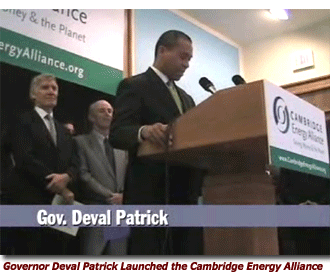
City of Cambridge Partners with State, Businesses, Community Organizations and Residents, to Create $100+ Million Energy Initiative
Governor Patrick announces $2 million state revolving fund to take energy-saving, job-creating lessons to five more cities, starting with Boston.
CAMBRIDGE – March 29, 2007 – City of Cambridge officials, with the ringing endorsement of state and business leaders including Governor Deval Patrick, today launched the Cambridge Energy Alliance. This new non-profit organization will design, market, finance, manage, and document unprecedented efficiency improvements in the use of energy, water, and transportation. Overall, the Cambridge Energy Alliance initiatives will lead to a substantial reduction in the carbon emissions of the City of Cambridge.
Specifically, the Cambridge Energy Alliance aims to: reduce electricity demand by 50MW, a 15% peak load reduction; reduce annual electricity and water consumption by 10% city-wide; achieve a participation rate of 50% in each sector (e.g. municipal, commercial, residential); and reduce annual GHG emissions from the city by 150,000 tons (10%) by 2011.
Also, Governor Patrick announced the creation of MassEfficiency, a $2 million revolving loan fund that will finance start-up costs for replicating this energy initiative in five more Massachusetts cities. The City of Boston will be the first to take the lessons learned from the Cambridge Energy Alliance and apply them on a larger scale.
“The Cambridge Energy Alliance is pioneering a new model for energy efficiency that should be replicated by communities across the Commonwealth,” said Governor Deval Patrick. “MassEfficiency will help make that happen.”
The Cambridge Energy Alliance will carry out a $100+ million massive energy efficiency implementation effort, while also installing, where feasible, new renewable and clean energy generation, and technologies that curb electricity use during peak demand periods. If the entire state followed Cambridge's lead over the next half decade, the commonwealth would save the equivalent of two coal-fired power plants in electric demand reduction. The tagline of the program, which will also target transportation, water use and heating efficiencies, is Saving Money and the Planet.
Start-up support for this project has been provided by the Henry P. Kendall Foundation and the Barr Foundation.
“We are very excited about the project’s potential impacts and are committed to the project’s success,” said Rob Pratt, Senior Vice-President of the Henry P. Kendall Foundation. “As a foundation focused on climate change solutions, we view cities as the most promising areas for near-term success in efforts to reduce greenhouse gas emissions. In city environments, buildings represent 65-70% of the emissions, so a targeted energy efficiency approach is a clear win-win – reduced emissions and lower energy bills.”
A critical project component is the collaboration of stakeholders including Cambridge Health Alliance and city officials, members of the corporate community, university and civic leaders, utilities, energy suppliers, and regulators. New efficiency opportunities are being identified and planned for implementation.
“The Cambridge Energy Alliance will make the community a better place economically and environmentally,” said Robert W. Healy, Cambridge City Manager. “This very innovative approach that brings together unique financing, the latest in energy and building technology, and a broad outreach program will allow us to reach a much larger number of households and businesses than past efforts. With this approach the city will be able to make big strides toward its goal to reduce global warming pollution and at the same time make our households, businesses, and institutions more resilient against rising energy prices. I'm very pleased that the Kendall Foundation has chosen the City of Cambridge to be its partner in pioneering this new approach that we can share with other communities throughout the region and beyond.”
Cities naturally aggregate both needs and services and therefore can support the design of a unique, but replicable financial mechanism – a Revolving Fund for Energy Efficiency – as proposed by the Cambridge Energy Alliance. By sponsoring and then aggregating reductions of both energy consumption and peak demand within its borders, Cambridge Energy Alliance, in conjunction with its many collaborative stakeholders can participate in all markets that value such reductions. Once the Revolving Fund is in place, the project is expected to become fully self-sustaining.
“We are very excited to be part of a team that is creating an energy model for the future," said Thomas J. May, NSTAR Chairman, President and CEO. "The Cambridge Energy Alliance has designed an approach to energy efficiency that is focused on customer-based solutions that involve the whole community. This forward-thinking initiative will complement and enhance our existing efforts to help our customers save money and energy today, resulting in a cleaner, healthier environment for tomorrow.”
The project incorporates innovative financing techniques which could be used to develop similar energy efficiency projects in other Massachusetts communities as well as those across New England. Approximately 80% of the financing will come from private sources, without obligation to Cambridge or the state, resulting in an approach which should be highly attractive to cash strapped cities and towns. The remaining 20% will generally come from a number of electrical utility incentive programs that were established in part to promote energy efficiency. As a result, energy savings and clean energy installations will in most cases be paid for by the project financing and be repaid from future energy savings of the companies, Cambridge city facilities, universities, hospitals, small businesses and residents. No upfront costs will be required for such installations, and there will be no cost to Cambridge or state taxpayers.
Click to view video clip on "Cambridge Energy Alliance launches" from YouTube or visit the Cambridge Energy Alliance's website at www.cambridgeenergyalliance.org.

Robert L. Pratt, who founded the International Institute for Energy Conservation (IIEC) in 1984 and served as its first Chairman from the organization’s inception through 1994, was elected unanimously by the board of directors of IIEC to be its Chairman once again. Mr. Pratt has been engaged with IIEC as an active board member throughout its 22 year history. He takes over from Dr. Peter du Pont, who will continue to serve on IIEC’s newly formed advisory council.
As the IIEC nears its 25th Anniversary, Mr. Pratt’s return as Chairman represents an important milestone in its persistent and passionate pursuit of energy conservation in the developing world, specifically through the establishment of innovative financing mechanisms to break through traditional barriers and move toward implementation of “massive energy efficiency” programs and investments that address the growing challenges of energy security and climate change. His vision of a massive scale up of efficiency in the developing world capitalizes on IIEC’s approach in catalyzing the implementation of energy efficiency and renewable energy initiatives through its unique network of local professionals working on the ground in its regional offices.
Mr. Pratt is currently Senior Vice President of the Henry P. Kendall Foundation, where he leads the Foundation’s climate change and energy program. By initiating major climate programs in New England through the implementation of “massive energy efficiency,” distributed generation, and demand response, along with transportation initiatives, the Foundation hopes to demonstrate that significant greenhouse gas emissions can be reduced in the short to mid-term. Mr. Pratt formerly served as Director of the Massachusetts Technology Collaborative’s Renewable Energy Trust (RET), the $250 million fund through which he developed a series of innovative programs designed to promote the use of clean energy technologies, green building and schools, and build investment in the state’s renewable energy industry. Mr. Pratt is the Chairman Emeritus and a member of the advisory board of the American Council On Renewable Energy (ACORE), the Treasurer and a member of the board of the Alliance to Save Energy (ASE), and a member of the board of the Clean Energy States Alliance (CESA). Prior to directing the Renewable Energy Trust, Mr. Pratt was the founder, Chairman and CEO of Energia Global International, Ltd. (EGI), one of the leading renewable energy companies in Latin America. Founded in 1991 as a startup, EGI (now Enel Latin America) became a major company in the region, with hydroelectric, wind energy, and electricity distribution assets in Costa Rica, Guatemala, El Salvador and Chile. Mr. Pratt received an MPA from the John F. Kennedy School of Government at Harvard University, a JD from Georgetown University Law Center, and a BA in government with high honors from Wesleyan University.
After thirteen years of service at IIEC, ten as a project manager and Asia Regional Director, and three as Chairman of the Board, Peter du Pont is now focusing on his professional work in Asia. In late 2006, he joined the U.S.-based International Resources Group (IRG) to head up a new US-funded program, the ECO-Asia Clean Development & Climate Program. The regional program, funded by the U.S. Agency for International Development, is based out of Bangkok and works with Asian governments and corporations to address climate change by promoting policy and market interventions that help scale up investments in clean energy. Dr. du Pont is also Adjunct Professor in Energy & Environmental Policy at the Joint Graduate School of Energy & Environment in Thailand, and continues to collaborate closely with former IIEC colleagues in the region.
For further details, contact Dr. Nitin Pandit, President at +1.703.281.7263 or write This email address is being protected from spambots. You need JavaScript enabled to view it. .
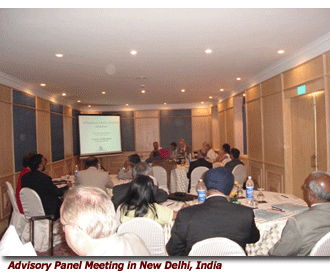
The International Institute for Energy Conservation has partnered with The US Hydropower Council for International Development (US Hydropower) to analyze market barriers to small hydropower development with member companies who are actively developing projects in India. The team is conducting an on-going policy dialogue with developers and other stakeholders to discuss investment and development issues which they are currently facing, particularly in the small and medium sized hydropower projects.
In response to the need to find solutions to the market barriers that hamper investment and development of small hydropower in India, the program has formed an Advisory Panel of Experts on Small Hydropower Development in India which will serve as a resource and a network to solve problems as they arise. The panel is a flexible and dynamic group of acknowledged experts from the U.S. hydropower industry, U.S. government agencies, the Indian small hydropower industry and the Indian central and state government agencies, and the first meeting of the advisory panel was held in November 2006 in New Delhi.
The team has also organized state focused round table consultations in the state of Uttaranchal in October 2006. Consultations with stakeholders in the states of Maharashtra and Himanchal Pradesh are also in the pipeline. The groups focused on the policy issues, finance mechanisms, and technical barriers to achieving the significant addition of small hydropower capacity identified by the Government of India as necessary to meet growing energy demand and a critical need for peaking power. It is anticipated that the recommendations collectively made by the panel and the state group will constructively inform the debate on issues of concern at the national and state level in both the public and private sectors. For more information on US Small Hydropower India Program, please contact Dolly Jain at This email address is being protected from spambots. You need JavaScript enabled to view it. .
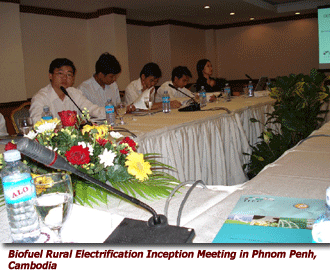
With financial support from the ESMAP program of the World Bank through the Global Village Energy Partnership (GVEP) Action Program Fund - GAPFund, IIEC is working with local partners in Cambodia to assess the feasibility of a new sustainable business model of biofuel-based off-grid rural electrification. IIEC also will assess the use of biofuels as substitute fuels for diesel in conventional generation. In Cambodia, about 85% of 15 million people (in 2.7 million households) still live in rural areas, and less than 10% of which have access to quality electricity supply. Most rural people rely on electricity services from small stand-alone grids operated by Rural Electricity Enterprises (REEs) and rechargeable car-batteries. It is estimated that there are more than 600 REEs and 1,500 commercial battery-charging stations throughout Cambodia. These businesses are operated by local entrepreneurs using diesel generator sets and the grids are constructed from materials locally available. Considerable system losses due to poor design and construction in combination with rising diesel oil price make poor rural communities in Cambodia face some of the highest electricity costs in the world at an average of more than US$0.50 per kWh.
IIEC aims to complete the assessment in mid-2007 and recommendations on sustainable biofuel-based rural electrification solutions will be submitted to the Cambodian government. The business models will support community development activities associated with biofuel production, e.g. from Jatropha, and utilization. The project was officially commenced with an inception meeting organized in Phnom Penh on December 18th, 2006. The meeting was attended by representatives of key government agencies, NGOs, REEs, and academic institutes. The inception meeting also formed a project advisory committee to support the project implementation and ensure that the outcomes will suit well with the Cambodian context. For more information, please visit the project website at www.bio2power.org or contact Sommai Phon-Amnuaisuk at This email address is being protected from spambots. You need JavaScript enabled to view it. .

The Eco-housing program, initiated in the Western Indian city of Pune with USAID support in the last two years, has successfully addressed the factors influencing the scale-up of sustainable housing development. Policy and market interventions led by IIEC in the first phase, have helped accelerate the adoption of energy efficient technologies and practices in the residential sector and have set the stage for expansion of the program at a national level.
The rating and certification system, developed around the Eco-housing assessment criteria, has helped build a significant momentum for sustainable construction practices in the regional market. Policy support both at the local and State level, tax rebates by the urban local body as well as specific housing mortgage products played a decisive role in scale-up of the program. Bank of Maharashtra (BoM) a leading nationalized bank in India announced a 0.25% rebate in interest rate on housing loan for Eco-housing projects. The Eco-housing certification has received an encouraging response from developers and two demonstration projects by private developers are already underway. After the successful customization of the assessment criteria to Mumbai city, several Municipal Corporations in Maharashtra have initiated the adoption of the Eco-housing program.
Building on this success, the second phase of the program will see the development of the Sustainable Building Technology Center (SBTC), and geographic scale-up supported by sensitization and capacity building of stakeholders in the Eco-housing supply chain. A significant achievement of the program is the commitment of over 3 acres of land by the Pimpri Chinchwad Municipal Corporation (PCMC) for the development of the SBTC. The SBTC will function as a hub to demonstrate, display, educate and test alternative construction techniques, eco-friendly products and technologies. For more details on this initiative, please contact iiecindia.org.
.
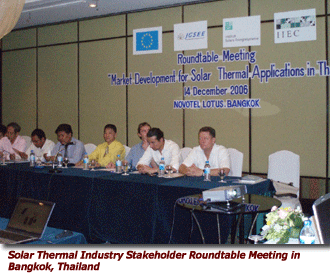
More than 30 participants from public and private sector participated in the roundtable meeting held on December 14, 2006, in Bangkok, Thailand, to discuss issues on government policy, equipment supply, quality and market potential for solar thermal in Thailand. The meeting was divided into 2 sessions; the morning session was designed for decision makers and policy and research related institutions such as Department of Alternative Energy Development and Efficiency (DEDE), Energy Efficiency Institute Thailand Foundation (EEIT), National Science and Technology Development Agency (NSTDA), UNIDO, King Mongkut’s University of Thonburi (KMUTT), Silpakorn University, and School of Renewable Energy Technology, Narasuan University. Participants agreed that the potential in energy saving and peak demand reduction in the evening hours are attractive and should be further emphasized to the high level decision makers. Although, currently there is no direct support for solar thermal from the Thai government, large solar thermal systems are eligible for the available Government’s Revolving Loan Fund.
The afternoon session focused on the private sector, for an in-depth dialogue about the market potential and quality issues. Ten solar companies had voluntary provide their annual sale for the estimation of market potential for solar water heater in Thailand. In 2005, the sale of solar system was approximately at 6,000 m2 (area of collector) and expected to increase at 25% annually. For more information, please visit the project website at www.soltherm-thailand.net or contact Sirikul Prasitpianchai at This email address is being protected from spambots. You need JavaScript enabled to view it. .
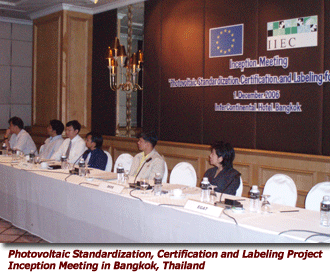
IIEC with support from the EU-Thailand Economic Co-operation Small Projects Facility (SPF) commenced the implementation of project entitled Photovoltaic Standardisation, Certification and Labelling for Thailand in December 2006. The project aims at introducing a quality structure for solar photovoltaic (PV) systems, components and installations in Thailand. The project inception meeting was held on the 1st of December at the Intercontinental hotel, Bangkok, with participation from EU representative and stakeholders from the Thai PV Industry, including Thai PV manufacturers (Solartron, Bangkok Solar, Sharp, Siam Solar and Electronics and Ekarat), Government agencies (Department of Alternative Energy Development and Efficiency, Thai Industrial Standard Institute, National Science and Technology Development Agency) and test laboratories (CES).
The Thai PV industry has acknowledged that poor installation is one of the major causes of the PV system failure in Thailand, particularly in the Government Solar Home System Program, and improvement of installation practice and other supporting factors such as product quality is vital to the sustainable growth of the industry. With proper standard, labeling and certification schemes in place, the Thai PV stakeholders and consumers can mutually benefit from better product and system quality as well as longer service lifetime. In the inception meeting, the Thai PV stakeholders agreed in principle that through this project, IIEC should further coordinate this initiative to improve PV system quality in Thailand. For more information, please visit the project website at www.pvthailand.org or contact Sirikul Prasitpianchai at This email address is being protected from spambots. You need JavaScript enabled to view it. .
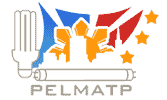
IIEC has recently won a sub-contract entitled, “Business Financing Capacity Building” under the Philippine Efficient Lighting Market Transformation Project (PELMATP). The project is implemented by the Department of Energy and funded by UNDP-GEF. IIEC’s work under the sub-contract will contribute towards creating business opportunities in energy efficient lighting systems (EEL) financing and removing the financial barriers to widespread utilization of EEL in the Philippines. It aims to increase the capacity of local financial institutions to provide financing assistance program on EEL system projects. IIEC’s work will commence on January 2007 and is expected to complete by early June 2007. For more information, please contact Lei Dealino at This email address is being protected from spambots. You need JavaScript enabled to view it.
.
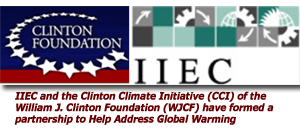
The Clinton Climate Initiative (CCI) of the William J. Clinton Foundation (WJCF) and IIEC have formed a partnership to support implementation of programs that directly result in substantial greenhouse gas emissions reductions with measurable results to help address issues of global warming. WJCF-CCI and IIEC have entered into a Memorandum of Understanding in October 2006 to set forth a long term working relationship between two parties. The partnership aims to accelerate greenhouse gas emission reductions through the global influence of the former President Clinton and IIEC’s experience in developing innovative and pragmatic approaches on energy conservation and efficiency. For more information, please contact Dr. Nitin Pandit at This email address is being protected from spambots. You need JavaScript enabled to view it.
.
IIEC is pleased to announce that Ravi Mani has joined IIEC India as senior project manager. Ravi Mani has an environmental studies, engineering and MBA background and is also a LEED Accredited Professional by USGBC. He has over fifteen years management consulting and industry experience in North America, Europe and Asia in diverse industries - energy and environment, manufacturing and logistics.
Ravi's experience in renewable energy solutions, climate change, and energy efficient building design comes from senior leadership roles in IT Power India Pvt. Ltd. (Pondicherry, India), Inspiration (Cochin, India), and Sustainable Design Consulting (SilverSpring, MD, USA). Prior to that his experience in manufacturing and logistics industries in reputed firms like McKinsey and Deloitte and Touche was primarily in the area of strategy and operations - strategic planning, corporate finance, supply chain management, and Total Quality Management (TQM). Ravi is currently engaged in business development and project management activities related to IIEC service areas including Demand-Side Management, Sustainable Habitat, Climate Change, Energy Efficiency Pollution Prevention (E2P2), Renewable & Distributed Energy and Water & Energy Nexus.
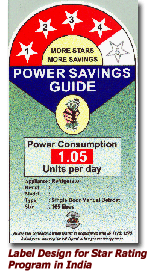 An energy-efficiency rating scheme for electrical appliances will soon come into force in India. The much-awaited star rating for consumer electronics and electrical appliances will come into force in India by the year-end, through a notification by the Ministry of Power. The rating will grade models on their energy efficiency, starting from one star for the least energy-efficient, and going up to five stars, for the most energy-efficient model. Though sources close to the development say the initial test period will cover refrigerators and will be a voluntary initiative from manufacturers, the target is to make it mandatory by mid-2007. An energy-efficiency rating scheme for electrical appliances will soon come into force in India. The much-awaited star rating for consumer electronics and electrical appliances will come into force in India by the year-end, through a notification by the Ministry of Power. The rating will grade models on their energy efficiency, starting from one star for the least energy-efficient, and going up to five stars, for the most energy-efficient model. Though sources close to the development say the initial test period will cover refrigerators and will be a voluntary initiative from manufacturers, the target is to make it mandatory by mid-2007.
"Though technically we are ready for a number of products, the Collaborative Labeling and Appliance Standards Program (CLASP) will initiate the process with refrigerators. A high level of consumer awareness and participation is needed to make this program a success," said Tanmay Tathagat, advisor to the Ministry of Power and Senior Energy Efficiency Specialist with IIEC-India. A study done by the Bureau of Energy Efficiency revealed that the scope for savings is as much as 25-30 percent of the power produced in the country. According to Tathagat, standards for a number of products such as tube lights, pumps, motors, air conditioners, televisions are already ready.
The move by the government to bring the star rating for consumer electronic and electrical appliances was kicked off way back in 1999, with the establishment of a Parliamentary Committee which was followed by an act of Parliament in 2001, called the Energy Conservation Act. This was later followed by establishment in 2002 of the Bureau of Energy Efficiency (BEE), under the Ministry of Power, with an agenda to make the star rating mandatory by 2007.
Along with the implementation of this star rating program, the BEE will also kick off a campaign to educate the consumers on the star rating scheme. Adequate precautions have also been taken to avoid spurious star labels from entering the market. "The labels will have a hologram with a serial number that will give details of the manufacturers, model and make of the product, making it practically impossible for any foul play," said Tathagat. The innovative use of this hologram was pioneered by IIEC working with Bangalore, India in its compact fluorescent lamp (CFL) program, which was launched in December 2004.
For more information on the Star Rating Program, please contact Tanmay Tathagat at This email address is being protected from spambots. You need JavaScript enabled to view it. .
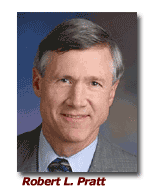
Rob Pratt, who co-founded IIEC in 1984, was featured recently in the Wall Street Journal for his role in helping US states lead the way in the development of large scale applications of renewable energy. Rob's efforts to demonstrate how renewables can play a vital role in US energy policy are pioneering at a time when fossil fuel consumption has become the Achilles' heel of US relations with the rest of the World. As Director of the Renewable Energy Trust in Massachussetts, Rob brings more than 25 years of experience in renewable energy and energy efficiency project development, policy and advocacy. In addition to serving on the IIEC Board, he also is the Chairman of the Board of the American Council for Renewable Energy (ACORE), a non-profit organization based in Washington, D.C. focused on bringing renewable energy into the economic mainstream in the U.S.
For full article, please visit http://webreprints.djreprints.com/1244350607845.html.
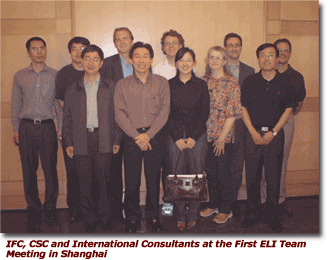
The Efficient Lighting Initiative (ELI), implemented by the International Finance Corporation (IFC) between 1999 and 2003 in Argentina, Czech Republic, Hungary, Latvia, Peru, Philippines and South Africa, has demonstrated a substantial market impact, especially on sales and prices of CFLs in the original seven countries. IFC is now using the ELI brand as a springboard to launch a self-sustaining, fee-based, quality certification service for efficient lighting products worldwide, with an emphasis on developing countries. The China Standard Certification Center (CSC) will administer the next generation of ELI. IIEC will be a part of the international consultant team assisting CSC to extend product certification to a wider range of efficient lighting technologies worldwide, including promotion of promising new technologies, such as light-emitting diodes (LEDs).
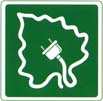
The ELI Team is led by Mr. Li Tienan of CSC, and the international consulting team includes Mr. Nils Borg, International Cooperation and Financing; Dr. Peter du Pont (Danish Energy Management A/S and IIEC Board Chair), Asia Outreach; Dr. Gilberto Januzzi, Latin America Outreach; and Mr. Sommai Phon-Amnuaisuk (IIEC-Bangkok), Manufacturer Liaison. Dr. du Pont will work to develop ELI program partners throughout Asia. Mr. Phon-Amnuaisuk will assist CSC to approach international lighting manufacturers to seek and initiate their cooperation, to integrate ELI with available resources of other energy efficiency market transformation programs in the region, and to coordinate this effort with other international consultants. For more information, please contact Sommai Phon-Amnuaisuk at This email address is being protected from spambots. You need JavaScript enabled to view it. .
IIEC shared its highly successful efficient lighting implementation experience in Sri Lanka and India with the international community at the 6th International Conference on Energy-Efficient Lighting (Right Light 6 - RL6), held in Shanghai, China 9-11 May 2005, hosted by the International Association for Energy Efficient Lighting (IAEEL), in association with the internationally supported China Green Lights Project. A total of more than 100 papers were presented at the Right Light 6 Conference. Among the papers, was a presentation on the promotion of compact fluorescent lamps (CFL) by Felix Gooneratne. The paper focused on the evolutionary experience of implementation of CFL programs by utilities, first in Sri Lanka and most recently in Bangalore, India. For more information, please contact Felix Gooneratne at This email address is being protected from spambots. You need JavaScript enabled to view it. .
Also at the Right Light 6 Conference in Shanghai, more than 80 delegates, including IIEC, participated in a special session hosted by the Australian Greenhouse Office (AGO) covering compact fluorescent lamps (CFLs). At this session, key lighting policy makers, practitioners, manufacturers, researchers and academics from around the world participated in the discussion with the objectives to agree to the principles of harmonization and to map a route forward. The participants agreed in principle to work toward creation of a uniform test method, covering the various performance features of self-ballasted CFLs; to carry out round-robin testing of CFL performance at a range of international test laboratories; to work toward a common set of "tiers" of voluntary performance specifications for CFLs; and to work collaboratively and engage the international lighting community in this International CFL harmonization Initiative. A special web site has been set up on the APEC ESIS web site to serve as a clearinghouse for information and progress on the CFL initiative. For more information, you can visit http://www.apec-esis.org/cfl/.
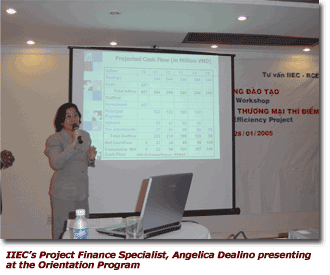
IIEC has been selected by the World Bank to provide training to the private sector in promoting energy efficiency investment in Vietnam. This training effort is part pf a four-year Commercial EE Pilot Program executed by the Ministry of Industry in Vietnam, aimed at testing business models for EE project implementation. The capacity-building program undertaken by IIEC will include energy service providers (Project Agents); site owners interested in EE projects (Project Proponents); and financial institutions (Financial Service Providers).
The training program for the Project Agents includes all aspects of the project development cycle - energy auditing, economic & financial analysis, contracts, monitoring & verification, project management and marketing. Financial Service Providers will undergo training in appraisal of EE Investment proposals. The training will be conducted in Hanoi and Ho Chi Minh City over a three-year period.
The training program commenced in January 2005 with orientation programs for the stakeholders. This was followed by training in energy auditing and economic & financial analysis in April and May 2005. As a part of the training, IIEC will be developing two projects (a textile factory and a hotel) that will serve as case studies for the program. The IIEC project team includes two partners from Sri Lanka - EnergySolve Ltd and LTL Energy Ltd who have practical experience in EE project implementation.
For more information, please contact Felix Gooneratne at This email address is being protected from spambots. You need JavaScript enabled to view it. .
After more than a year awaiting ministerial approval, South Africa's Energy Efficiency Strategy was officially launched in May 2005. As one of the world's highest per-capita emitters of CO2, South Africa recognizes the importance of the role of energy efficiency in combating climate change. In addition to the global environmental impacts of an energy-intensive economy, and the health impacts of residential fossil fuel use, South Africa also faces the prospect of power shortages, as the growing demand for electricity threatens to outstrip currently installed capacity in the near future. The Energy Efficiency Strategy thus has to strike a balance between a range of different goals.
Under the Danida-supported CaBEERE program (Capacity Building in Energy Efficiency and Renewable Energy), IIEC-Africa is assisting the Department of Minerals and Energy (DME) in the development of the monitoring system. On this project, IIEC is working with Danish Management Group, which has extensive international experience in program monitoring & evaluatoin schemes. Following a review of international best practice in energy efficiency monitoring, the IIEC team staged two stakeholder workshops in April. These aimed to engage the involvement of, and seek feedback from, key organizations and individuals who are seen as data providers. The monitoring progress towards the achievement of energy efficiency targets is very data-intensive, so buy-in [Extra Space in layout] from these stakeholders is crucial to the success of the system. The outcomes of these workshops are currently guiding IIEC towards the final definition of the data that are required (and that can be realistically collected) for effective monitoring. For more information, please contact Ian Househam at This email address is being protected from spambots. You need JavaScript enabled to view it. .
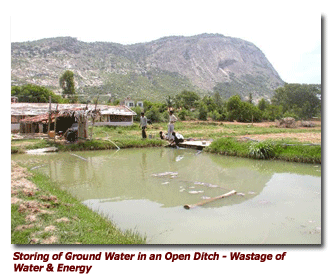
In India, IIEC is implementing a USAID-funded project to develop a model for the co-management of water, energy and biomass. The Water-Energy-Biomass (WEB) Project has been designed to improve the efficiency of water and electricity use in biomass production and the use of biomass in improving water and electricity supply. The project covers 5 villages, over 5147 ha and a population of 11800. The analysis confirms that in the agriculture sector in India, inefficient use of any individual resources, say water, results in falling yields in energy and biomass resources, and efficiency in individual resources benefits all others.
In the agriculture sector, an important resource conservation technique is crop diversification. In the WEB project area, this would result in an improved income of $4.50/ha, a reduction in production cost of $9.50/ha, reduction in water demand by almost 1.0 Million Cubic Meters (MCM) per year and a subsequent decrease in electricity demand of approximately 200 MWh/year. Two biomass, primarily agricultural residue, based electricity generation units, of 750 KW and 500 KW, are p lanned in the project area. Electricity conservation and alternate sources will result in GHG emission reduction of almost 8600 MTCO2 per year and additional emission reduction will be achieved from the recommended land use change and bio-fuel use. lanned in the project area. Electricity conservation and alternate sources will result in GHG emission reduction of almost 8600 MTCO2 per year and additional emission reduction will be achieved from the recommended land use change and bio-fuel use.
The implementation of the Water-Energy-Biomass (WEB) project requires large scale grass root intervention as it addresses concerns in multiple sectors. Government departments namely, revenue, ground water, irrigation, agriculture, marketing, electricity and so on, have a direct presence in the rural areas and individually implement various initiatives. The WEB project is being implemented through relevant government agencies, as this would facilitate the mainstreaming of the multi-sector program into government policy and planning. The Centre for Sustainable Technologies (CST), in the Indian Institute of Science (IISc) is a key partner in evaluation, design and implementation of the biomass component of the project. Local communities are closely associated with the project from the initial stage of baseline data collection, through periodic discussions. The village committees have passed resolutions, accepting the biomass-based power units and the WEB interventions, creating a higher degree of ownership among the villagers.
The project is unique in its blend of technological, policy level and social interventions. For more information, please contact Sanjay Dube at This email address is being protected from spambots. You need JavaScript enabled to view it. .
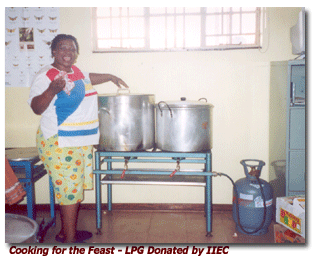
The International Institute of Energy Conservation, whose South Africa office is based in Johannesburg, has recently run a very successful project that promotes the awareness of LPG to low-income households. This project, funded by USAID until December 2004, involved the practical demonstration of LPG as a more healthy and environmentally friendly cooking fuel. The project effectively engaged with the local community by developing a short drama performance that aimed to raise awareness of the benefits to householders of using LPG in an entertaining and informative way. This piece of theatre has been performed in conjunction with practical demonstrations in schools, clinics and community centres within two townships in Region 11, Gauteng.
The Methodology…
Multiple fuel use and fuel switching to meet energy needs in low-income households can be approached in a way that also addresses the problem of deteriorating health in low income households, as a result of poor indoor air quality. Liquefied Petroleum Gas (LPG) is a clean form of energy that is efficient for cooking, water and space heating and thus low-income households in South Africa could benefit from fuel switching to LPG.
To this end, IIEC-Africa has provided capacity building assistance to key stakeholders in the transformation of the LPG market amongst low-income communities in South Africa. This has been achieved by promoting the acceptance of LPG in pilot communities.
Initially, the project engaged with the community structures of the chosen pilot areas (Orange Farm and Fine Town - both within Region 11, Gauteng Province) in order to identify how best to promote the benefits of LPG as an alternative household fuel within these low-income communities. The content of the meetings focused on the methodology of creating awareness and improving acceptability. Hence community members identified that the use of drama was a good way of getting the message across and informing local householders of the health benefits of fuel switching. Practical demonstrations, including hands-on experience of LPG use, were also to be used especially to allay people’s fear of LPG, previously identified as the main barrier to LPG’s acceptability.
The Communities that benefit…
Two communities were selected for this pilot study funded by USAID: Orange Farm and Fine Town. Both of these communities are situated to the south of Johannesburg in Region 11, within the City of Johannesburg municipality. From the information recorded in “Statistics South Africa”, these neighbourhoods are predominantly black African, dwelling equally in formal and informal settlements. Many extensions in these areas are not yet electrified and lighting sources continue to be candles and/or paraffin. Even in electrified areas, the regularity of outages to the supply result in cooking predominantly with paraffin. Most households do not have a regular monthly income, but for those that do, the annual household income averages in the R4800 – R19000 bracket. Demonstrations of LPG have been to householders who predominantly live in LSMs 3-4.
These communities were selected as they have not yet experienced the donor fatigue of other localities and, since they are situated on the main N1 arterial route between Johannesburg and Bloemfontein, the heavy air pollution, especially from coal use in winter, is highly visible.
The field-workers/performers are drawn from the target communities…
IIEC works closely with ten community members who live in the target communities of Orange Farm and Fine Town. These people are respected within their communities (some are already health-workers) and, as the project’s field-workers, have been trained in energy awareness issues. These same field-workers have also proved themselves as very proficient actors and this small group has worked on devising the performance as well as taking it out to the public.
All the field-workers have been trained in LPG awareness and safety by Simon Moahloli of LPG Safety Association of SA.
Promoting LPG awareness in low-income households…
In total, the IIEC – LPG project was able to conduct eleven practical demonstrations. These took place at clinics, schools, retail businesses and public events. Once the short drama was conceived and devised, we were able to run the performance in conjunction with these demonstrations.
The drama promotes the ease and simplicity of cooking with LPG as well as explaining the health benefits. After the performance, the field-workers are on hand to answer any questions put to them by the interested public.
The success of the IIEC - LPG project is evidenced by the fact that the local community has shown great enthusiasm and support for our work by requesting that we attend community events and activities. On one such occasion, the project was invited to set up a marquee at the Orange Farm Social Development Services community day.
The drama itself was premi?red at the official opening of Thuthukani Tswelopele Primary School in Fine Town and was very well received, judging by the rapt attention of the audience! The school was holding an inauguration celebration; 10 years of its existence coinciding with 10 years of democracy in South Africa. This was a prestigious occasion indeed, attended by 300 of the school’s current intake, their proud parents and all the local dignitaries of the township. The official opening of the Thuthukani Tswelopele Primary School was a fine celebration and we were fortunate to have been invited to play such a vital role.
The drama promoting LPG…
The drama performances have proven to be a powerful means of engaging the public; most performances are held in places where our prime audience are women, who cook and look after the household directly. The field-workers have collected a substantial data-base of contact details from local people who would like to find out more about purchasing and using LPG – to date, over 600 beneficiaries have been engaged in this way.
IIEC has been able to effectively engage with the local community and we feel privileged to have been able to come so close to the people living in the townships within which we are promoting LPG. Our project has really taken off and the feedback that we receive from these communities is always so positive. We hope to develop our educational drama further and “roadshow” it around the township communities. Unfortunately our funding runs out early in 2005. It will be a great shame to see this dynamic programme lose its momentum.
Click to view "National LP Gas Drama"

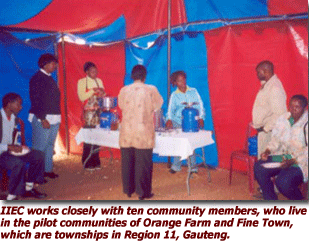
The International Institute of Energy Conservation is reaching the end of Phase II in this very successful project that promotes awareness of LPG in low-income households. This phase of the project, currently funded by USAID, has involved the practical demonstration of LPG as a more healthy and environmentally friendly cooking fuel.
The field-workers are drawn from the pilot communities…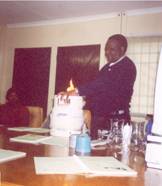
IIEC works closely with ten community members, who live in the pilot communities of Orange Farm and Fine Town, which are townships in Region 11, Gauteng. These people are respected within their communities (some are already health-workers) and, as the project’s field-workers, have conducted the practical demonstrations of LPG in a variety of locations accessed by the public. All the field-workers have been trained by Simon Moahloli of LPGSASA. This training was provided free of charge and gave the field-workers the necessary confidence to perform their duties.
 LPG demonstration equipment… LPG demonstration equipment…
In order to carry out the demonstrations, IIEC needed to have access to a range of LPG cooking equipment. We were most fortunate that CADAC donated portable cylinders, 2-ring stoves and cooker tops for our use. At a later date, Safety Gas and Easigas were able to donate a sample of their newly developed cooker tops designed specifically for the low-income market.
Promoting LPG awareness in low-income households…
In total, the IIEC – LPG project was able to conduct eleven practical demonstrations. These took place at clinics, schools, retail businesses and public events.
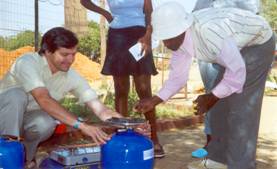 The demonstrations promote the ease and simplicity of cooking with LPG. The field-workers also explain the health benefits and answer any questions put to them by the interested public. These same participants are then encouraged to have hands-on experience by lighting the LPG for themselves. Since fear of LPG remains a major barrier to its acceptability, this approach is particularly effective. The demonstrations promote the ease and simplicity of cooking with LPG. The field-workers also explain the health benefits and answer any questions put to them by the interested public. These same participants are then encouraged to have hands-on experience by lighting the LPG for themselves. Since fear of LPG remains a major barrier to its acceptability, this approach is particularly effective.
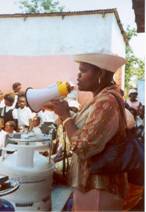
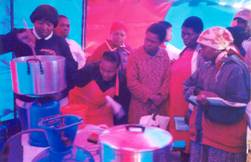 The IIEC - LPG project has also lent LPG cooking equipment to 15 households, providing them with the opportunity of testing out LPG on a longer-term basis. The success of the IIEC - LPG project is evidenced by the fact that the local community has shown great enthusiasm and support for our work by requesting that we attend community events and activities. On one such occasion, the project was invited to set up a marquee at the Orange Farm Social Development Services community day. At this event, we were able to provide tea and popcorn for those members of the public attending as well as undertake effective practical demonstrations of the LPG cooking equipment. The IIEC - LPG project has also lent LPG cooking equipment to 15 households, providing them with the opportunity of testing out LPG on a longer-term basis. The success of the IIEC - LPG project is evidenced by the fact that the local community has shown great enthusiasm and support for our work by requesting that we attend community events and activities. On one such occasion, the project was invited to set up a marquee at the Orange Farm Social Development Services community day. At this event, we were able to provide tea and popcorn for those members of the public attending as well as undertake effective practical demonstrations of the LPG cooking equipment.
Highlights of our awareness creation programme…
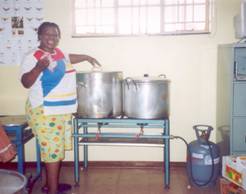
 One particular highlight occurred when the IIEC - LPG project was honoured with an invitation to demonstrate the benefits of LPG use at Thuthukani Tswelopele Primary School in Fine Town. The school was holding an inauguration celebration; 10 years of its existence coinciding with 10 years of democracy in South Africa. This was a prestigious occasion indeed, attended by 300 of the school’s current intake, their proud parents and all the local dignitaries of the township. One particular highlight occurred when the IIEC - LPG project was honoured with an invitation to demonstrate the benefits of LPG use at Thuthukani Tswelopele Primary School in Fine Town. The school was holding an inauguration celebration; 10 years of its existence coinciding with 10 years of democracy in South Africa. This was a prestigious occasion indeed, attended by 300 of the school’s current intake, their proud parents and all the local dignitaries of the township.
The IIEC - LPG project’s contribution to the event was two-fold; we assisted with the feast by providing LPG cooking equipment and our project field-workers premièred their drama about the health benefits of using LPG in the home (see below). The official opening of the Thuthukani Tswelopele Primary School was a fine celebration and we were fortunate to have been invited to play such a vital role.
IIEC has been able to effectively engage with the local community and we feel privileged to have been able to come so close to the people living in the townships within which we are promoting LPG. A fine example of this relationship is shown by our invitation to a traditional Zulu wedding celebration held in Orange Farm; the project was again able to promote LPG through providing the fuel and cooking equipment for yet another superb feast!
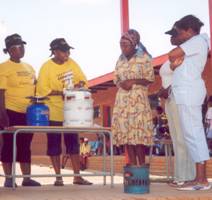 The demonstrations have shown that they are a powerful means of engaging the public; the field-workers have collected a substantial data-base of contact details from local people who would like to find out more about purchasing and using LPG. It now becomes imperative to build on this interest by devising ways to improve the accessibility and affordability of LPG. The demonstrations have shown that they are a powerful means of engaging the public; the field-workers have collected a substantial data-base of contact details from local people who would like to find out more about purchasing and using LPG. It now becomes imperative to build on this interest by devising ways to improve the accessibility and affordability of LPG.
A drama promoting LPG…
The field-workers have devised a short performance that aims to raise awareness of the benefits to householders of using LPG in an entertaining and informative way. This drama was premièred at the official opening of Thuthukani Tswelopele Primary School and was very well received, judging by the rapt attention of the audience!
We hope to develop this performance further and “roadshow” it around the township communities.
A new web site has been launched to provide information about the eco-housing concept while also updating partners and stakeholders about a new eco-housing partnership in India. IIEC, the principle implementing agency of the Eco-Housing Mainstreaming Partnership, recently launched a web site to provide information about the project. The web site provides users with project details, features the partners associated with the program and explains eco-housing concepts and the proposed project interventions. The site will also host a resource center and photo gallery on various aspects related to eco-housing and serve as a medium for updating program partners on ongoing project developments. Partners will be able to view project reports, presentations, timelines, meeting schedules and forthcoming events.
The program, which is funded by the US Agency for International Development (USAID) and the US Global Development Alliance (GDA), commenced in October 2004 and aims to initiate a market development process and support the long- term sustainability of eco-housing practices in India. Initiated by the U.S. Asia Environment Partnership (USAEP) project of USAID, the partner agency representing this US-India bilateral program, the project will establish baselines for eco-housing practices; support the formation of eco-friendly financing packages; and showcase a model eco-housing project. Initially, the program will be focused in the western region of India and will include a business model for subsequent geographic extension.
IIEC is focusing on building partnerships and working together with stakeholders in different areas of expertise to institutionalize eco-housing practices in the country. With this objective in mind IIEC has already initiated a dialogue with key partners, including the Pune Municipal Corporation, which has offered land for demonstrating the development of Eco-Housing; associations of builders and architects in India; and leaders in housing finance products. The program will also develop a focused plan for training of target stakeholders and establish long-term capacity building partnerships with other organizations to support entrepreneurship in eco-housing. For more information, please contact This email address is being protected from spambots. You need JavaScript enabled to view it..
.
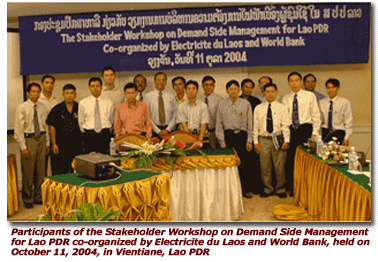 The Lao Peoples Democratic Republic (PDR) is on the way to developing a strategy and plan for demand-side management to assist in managing its future load growth. The Lao Peoples Democratic Republic (PDR) is on the way to developing a strategy and plan for demand-side management to assist in managing its future load growth.
Held on October 11, 2004, in Vientiane, Lao PDR, more than 20 representatives from local public and private sector organizations participated in a stakeholder meeting to discuss various DSM program options proposed by IIEC. The meeting, co-organized by Electricity du Laos (EdL), Department of Electricity, Ministry of Industry and Handicraft (MIH), and IIEC, and supported by the World Bank, is a crucial element in the formulation process of DSM action plan for the Demand-Side Management/Energy Efficiency (DSM/EE) program under the Southern Provincial Rural Electrification II Project (SPRE II).
Mr. Savath Phoumlavanh, Deputy General Manager, Distribution Division of EdL, stressed in his welcome speech the importance of gaining inputs from national stakeholders to finalize the DSM programs that could be undertaken by EdL in the coming years. During the meeting, participants shared their views, experience and concerns on various existing energy conservation initiatives that could be driven further and complemented by the proposed DSM program action plans. Participants agreed that the DSM/EE program is the important tool that will not only enhance export opportunities for EdL through electricity-saving in various domestic end-use sectors, but will also improve EdL's accounts receivable by redicing consumption in subsidized end-use sectors. In addition, the DSM/EE program will reduce production costs for the local manufacturing industries and increase their competitiveness as ASEAN becomes a free-trade region and other international trade barriers are reduced. For more information, contact Felix Gooneratne at This email address is being protected from spambots. You need JavaScript enabled to view it. .
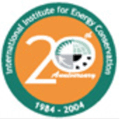 joined Chairman Peter du Pont and President Nitin Pandit in Washington on 29 October for an evening reception to celebrate 20 years since the founding of IIEC and the expansion of IIEC to become a distributed organization with local offices and staff in seven countries. . Rob Pratt, founder and current Board member, was present along with several other current Board members, including Kingsley Haynes and John Mollet. Also in attendance were several past Board members of IIEC including John Fox of Perseus LLC; Russell Sturm of the International Finance Corporation; Matthew Mendis of IRG Consultants; Griff Thompson of the U.S. State Department; and Jim Wolf of James L. Wolf Consultants. Deborah Bleviss and Peter Garforth were on the road and sent their best wishes. joined Chairman Peter du Pont and President Nitin Pandit in Washington on 29 October for an evening reception to celebrate 20 years since the founding of IIEC and the expansion of IIEC to become a distributed organization with local offices and staff in seven countries. . Rob Pratt, founder and current Board member, was present along with several other current Board members, including Kingsley Haynes and John Mollet. Also in attendance were several past Board members of IIEC including John Fox of Perseus LLC; Russell Sturm of the International Finance Corporation; Matthew Mendis of IRG Consultants; Griff Thompson of the U.S. State Department; and Jim Wolf of James L. Wolf Consultants. Deborah Bleviss and Peter Garforth were on the road and sent their best wishes.
 The evening was kicked off with ice-breakers and as noted by one IIEC alumnus, Mike Philips, seemed like a homecoming week for many friends and colleagues in the energy efficiency community. Terry Oliver, former IIEC-Asia Director, took a red-eye flight from the west coast and brought along albums of old IIEC photos for the participants to enjoy. Denise Knight, Bos Dewey, and Scott Knudsen gave the attendees a tour of "IIEC Today" using colorful maps of IIEC's worldwide operations printed in the Bangkok office. The highlight of the evening was a panel discussion by including present and former IIEC board membes on "Mainstreaming Efficiency". The discussion was moderated by Peter du Pont and included short presentations by Rob Pratt, John Fox, Russell Sturm, Griff Thompson, and Nitin Pandit. The initial presentation was by invited guest, Dilip Limaye, who also made the evening possible through a generous donation by the Sharon Limaye Foundation. The panel discussion brought perspective to the challenges of implementing and making systemic changes in the energy sector. While Dilip Limaye focused on the evolving mechanisms for integrating efficiency into the financial mainstream, Rob Pratt gave a stimulating synopsis of the catalytic role IIEC has played in bringing such new ideas to the energy-efficiency community. Griff Thompson reflected on how generic issues related to governance are directly related to energy efficiency; and Nitin Pandit provided a view of the emerging role of civil society in implementing the scale-up of energy efficiency programs. Russell Sturm provoked the audience by critiquing conventional energy-efficiency programs and noting that "we are the mainstream … let's act like it." And in a seasoned reflection of the energy efficiency movement, John Fox emphasized that energy efficiency was even more relevant today… "In 1976, we all projected that primary energy use in the US would grow from 75 Quad to 150 Quad. Today, we are at 95 Quad - to some significant extent due to increase in efficiency. And yet, we have fiscal instability and war. Imagine what the world would have been like if our projections had come true."
With that, a number of attendees in the audience wished the best to IIEC and expressed the hope that the 25th anniversary would be on grand scale in some exotic location.
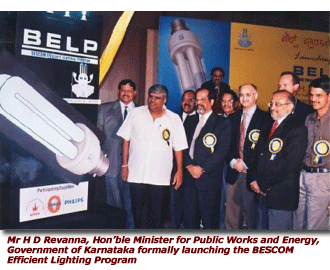 Compact fluorescent lamps (CFLs) are more expensive than traditional incandescent lamps, and the challenge is to overcome this barrier and to make it easy for ordinary consumers to purchase them. Through close cooperation with CFL suppliers, a new program launched in India should help stimulate market channels, while reducing the opportunity for sale of fake or sub-standard lamps.
In December 2004, a unique utility-driven lighting initiative the "BESCOM Efficient Lighting Program" (BELP) was launched by Mr H. D. Revanna, Honorable Minister for Public Works and Energy, Government of Karnataka. Initiated by the Bangalore Electricity Supply Company (BESCOM), BELP will reach out to 1.6 million residential consumers through innovative Direct Sale and Monthly Installment schemes. Consumers will have the option of either directly purchasing a CFL with a one-year warranty; or paying through an installment scheme on their utility bill, in which the extra cost of the CFL is recovered by consumers through monthly savings spread over a period of nine months. The market-based scheme used in BELP relies on close cooperation with the suppliers and a short-listing process through which three local suppliers of CFLs qualified to participate in the program.
Through this program, individual consumers can buy a maximum of five lamps from any of 400 outlets across the Bangalore urban district at subsidized rates. This unique residential lighting program gives consumers an opportunity to replace energy-intensive conventional lamps with energy efficient CFLs in areas of high usage such as corridors, the kitchen, and the portico. Each light replaced with a CFL will result in a savings of approximately Rs15 (US$ 0.34) per month. Another special feature of the program is a special hologram sticker with a unique identifier for each lamp. The hologram cannot be duplicated and will break if anyone attempts to remove it from the CFL.
This one-of-a-kind program will support energy conservation in India's residential sector with an emphasis on protecting consumer interests - primarily that of product pricing and warranty servicing. The BELP program is supported by the US Agency for International Development (USAID) as part of the ECO-II initiative in India, which is being implemented by IIEC.
Visit: http://www.usaid.gov/in/MediaCenter/Press-Dec10-04.htm for welcome remarks by Mr William Martin, Acting Mission Director, USAID India on the occasion of the launch.
For more information on the ECO II program, contact Mahesh Patankar at This email address is being protected from spambots. You need JavaScript enabled to view it. .
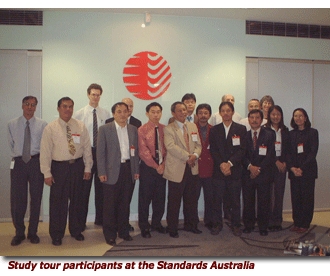 The Australian Greenhouse Office (AGO) and the Collaborative on Labelling and Standards Programs (CLASP), led by IIEC, organized a study tour for technical experts from APEC and ASEAN economies to visit Australia from 22 to 26 November 2004. The tour brought together high-level technical experts from lighting testing laboratories and certification bodies in China, Indonesia, Malaysia, Philippines and Thailand, and it provided a unique opportunity for these experts to discuss the test methods and procedures for energy performance testing of fluorescent lamp ballasts. The Australian Greenhouse Office (AGO) and the Collaborative on Labelling and Standards Programs (CLASP), led by IIEC, organized a study tour for technical experts from APEC and ASEAN economies to visit Australia from 22 to 26 November 2004. The tour brought together high-level technical experts from lighting testing laboratories and certification bodies in China, Indonesia, Malaysia, Philippines and Thailand, and it provided a unique opportunity for these experts to discuss the test methods and procedures for energy performance testing of fluorescent lamp ballasts.
During the study tour, official delegates had a number of meetings with Australian organizations based in Victoria and New South Wales including the Australian Greenhouse Office (AGO); the Department of the Environment and Heritage; the Office of the Chief Electrical Inspector Victoria (state energy regulator); the Lighting Council of Australia (industry association); Standards Australia (national standard body); and two testing laboratories (Tridonic.Atco, the largest lighting manufacturer in Australia, and LightLab)
As a result of the study tour, delegates agreed to work with CLASP and AGO in conducting "round-robin" testing within participating laboratories to confirm the usefulness of the Australian/NewZealand ballast test methodology, which references IEC and EN standards, within APEC economies. The results on this round-robin testing are expected to be available by mid-2005. For more information, contact Sommai Phon-Amnuaisuk at This email address is being protected from spambots. You need JavaScript enabled to view it. .
Mr. Paul Kirai, General Manager of the GEF-KAM (Kenya Association of Manufacturers) program, visited Brazil for four days and during this period IIEC-Brazil arranged his schedule and joined him in several meetings. Mr. Kirai's objectives were to receive information and understand the ongoing activities related to energy efficiency in industrial sector. Mr. Kirai met with the following organizations:
PROCEL Brazil's national energy efficiency program, which has developed projects in industry and currently develops an extensive capacity building program in partnership with industry state federations. Presently, PROCEL has agreements with 13 federations, and the objective is to carry out more than 200 audits in industrial facilities.
GERBI (Greenhouse Gas Emissions Reduction in Brazilian Industry). This program aims to support Brazilian agents (industries, consultants and financers) in the creation of market-based transactions that use energy efficiency to reduce GHG emissions.
LIGHT (local utility). In Brazil, utilities invest 0.5% of annual revenues in energy efficiency actions, and Mr. Kirai had the opportunity of understanding better the mechanisms of this program, responsible for injecting more than US$ 100 million per year into the market.
SEBRAE SEBRAE is an organization with the mission of supporting small and medium-size companies in Brazil. It has operated for 10 years and has programs related to energy efficiency, productivity, and environmental improvements.
Presenting useful information on energy efficiency and project finance to industrial and commercial facility managers is always a challenge. IIEC and PA Consulting have been working with Electrobras, the Brazilian electric utility, to create a novel approach to this problem. Under a World Bank program, IIEC is assisting in the development of an interactive Project Development and Finance Guide, which will be made available on a web portal sponsored by PROCEL, Electrobras's energy-efficiency unit.
In place of the normal static display of information, the consulting team has been creating a web-based technical guide that allows the user to view the project development process as an interactive diagram, in which they can access information and/or decision support models that correspond to their own stage of project development. The guide then walks through each step and allows the user to develop the documentation (e.g., business plans) and financial analysis (including analyses of both debt and equity) needed to enable management and financial institutions to evaluate the economic soundness and returns of their project. The web-based finance guide will be in Beta demonstration phase by early November, and will be finalized by the end of the year. For further information, contact Bosworth Dewey at This email address is being protected from spambots. You need JavaScript enabled to view it. .
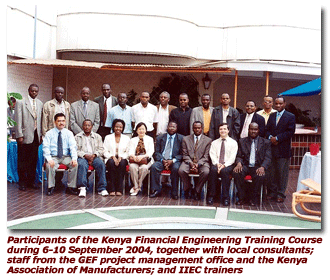
The Kenya Association of Manufacturers recently conducted its 4th Training Course in Financial Engineering. The training was intended to increase the capability of industry engineers and managers to develop bankable energy efficiency projects and help them integrate energy efficiency into the operation of their organizations. It also aimed to leverage the delivery of the financial training course by developing the capability of local consultants to conduct similar financial engineering courses in the future.
The IIEC team of Lei Dealino, Wayne Abayan and Ian Househam conducted the first training module during 6-10 September 2004 in Nairobi, with 13 participants from industry, utilities, consultancy firms and the academia. The second training module was held during 4-8 October, led by the IIEC Team of Lei Dealino, Bos Dewey, and Mahendra Jayalath. The training was supported by the Global Environment Facility, the United Nations Development Program, and the Government of Kenya. For more information, contact Ms. Lei Dealino at This email address is being protected from spambots. You need JavaScript enabled to view it. .
At the annual meeting of the World LP Gas Association in Berlin, Germany on 28-29 September, IIEC presented case studies of ongoing work and testing of LPG-solar thermal hybrids in India and South Africa. IIEC President Dr. Nitin Pandit described how the hybrid technology was an innovative approach to differing motivations in the two cases: in India, it is being driven by DSM programs for the unbundled distribution utility in Bangalore; and in South Africa, it is motivated by environmental health issues in Orange Farm. He also noted that the technical improvements in the hybrid system were characterized by simplicity and a novel design methodology. For more information on the Indian case, which aims to engage 25,000 customers in a pilot, contact Mr. Mahesh Patankar at This email address is being protected from spambots. You need JavaScript enabled to view it.. For more information on how the case study in Orange Farm also meets the South African government's Black Entrepreneurship Empowerment program goals, contact Mr. Ian Househam at This email address is being protected from spambots. You need JavaScript enabled to view it.
.
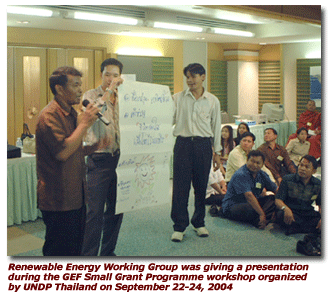
Boilers and hot water generators are major consumers of energy in all sectors. The renewable energy industry has long proposed the integration of solar-thermal technology as one important measure for efficiency improvement. However, while solar-thermal hot water systems have made significant inroads in some markets, their use in industrial and commercial settings has been minimal. As a part of IIEC's Solar-Thermal Market Facilitation Initiative (STMFI), ground-breaking projects in India and Thailand are being pursued to demonstrate commercial applications of solar-thermal system integration for boiler feed-water pre-heating. UNDP Thailand's GEF Small Grant Programme recently backed IIEC initiatives on Solar Thermal applications for communities in Thailand.
Two concepts for solar thermal applications - one for fish drying in Supanburi province and one for hot water in a municipal slaughterhouse in Rayong province -- received preliminary approval from UNDP Thailand. Both communities were invited to participate in the GEF Small Grant Programme workshop organized in Bangkok, Thailand, on September 22-24, 2004. These two projects are expected to receive final approval in November 2004, and implementation will commence next year. For more information, contact Mr. Sommai Phon-Amnuaisuk at This email address is being protected from spambots. You need JavaScript enabled to view it. .
In August 2004, IIEC was selected to provide technical assistance for a 3-year Commercial Energy Efficiency (EE) Pilot Program in Vietnam sponsored by the GEF through the World Bank. The Commercial EE Pilot Project will seek to test appropriate business models and mechanisms to catalyze a small and sustainable service market to support EE investments in Vietnam. This would be achieved by supporting a small group of commercial service providers or "Project Agents" in all phases of EE project identification, development and implementation.
The overall objective of this project is to develop the capability of Project Agents (equipment manufacturers, equipment suppliers, technical service providers, financial service companies) to implement a critical mass of pilot projects in the commercial sector to test the appropriate business models and establish a sustainable service market to support EE investments in Vietnam. IIEC will be conducting a comprehensive training program for all stakeholders and provide on-site assistance in project development and implementation. For more information, contact Felix Goonerate at This email address is being protected from spambots. You need JavaScript enabled to view it. .
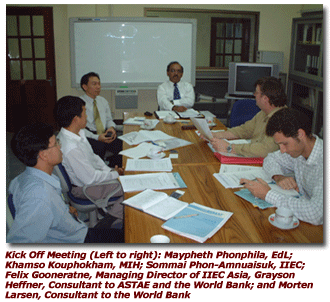
The World Bank, in association with the Global Environment Facility (GEF), is planning to undertake the Southern Provincial Rural Electrification II Project (SPRE II) in Lao PDR to expand rural electricity service in the central and southern provinces by extending the grid to some 50,000-75,000 households and providing electricity via off-grid technologies (including solar, village hydro, and distributed engine-generator sets) to another 18,000 households. SPRE II will also advance the power sector reform agenda in critical areas such as completing the commercialization of Electricity du Laos (EdL), continuing the process of tariff policy reform for the EdL grids, and creating a Demand-Side Management /Energy Efficiency (DSM/EE) program within EdL.
IIEC has been contracted to conduct a preliminary assessment of the DSM/EE potential in Lao PDR and to develop a strategy, program plan and institutional arrangements for DSM implemented through a DSM Cell to be established within EdL. The assignment, which will be completed during October 2004, is to conduct the background study, organizational planning and program development necessary to prepare EdL to undertake the DSM activities to be funded under SPRE II. In a parallel capacity-building project, a delegation of Lao officials will undertake a DSM study tour to assess and learn from DSM programs in Vietnam, Thailand, and Malaysia. The study tour is being coordinated by Danish Energy Management A/S. For more information, contact Felix Goonerate at This email address is being protected from spambots. You need JavaScript enabled to view it. .

Since its founding in 1984, IIEC has expanded to become an international non-profit organization with offices on five continents (Washington DC, London, Rio de Janeiro, Johannesburg, Mumbai, Delhi, Bangkok, and Manila) staffed by dedicated teams of local energy professionals. To celebrate the 20th anniversary of its founding, IIEC will be hosting a reception in Washington, DC on the evening of Thursday 28 October 2004, from 17:00 to 20:00.

The reception will be open to all in the sustainable energy community. It will feature a panel discussion with past board chairs and presidents of IIEC, including Rob Pratt of MASSCOM; John Fox of Perseus, LLC; Russell Sturm of the International Finance Corp.; Peter Garforth of Garforth International; and Griffin Thompson of the U.S. Department of State. The panelists will reflect on their experience within IIEC and afterward, and share their ideas and pragmatic solutions for scaling up and mainstreaming energy-efficiency in the developing world. Come, have a drink, share stories and anecdotes, and contribute to the discussion. For more information, visit the IIEC web site (www.iiec.org) or contact Dr. Nitin Pandit at This email address is being protected from spambots. You need JavaScript enabled to view it. .
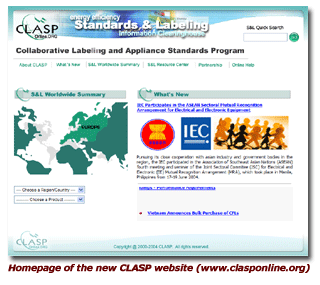
IIEC, a founding member of Collaborative Labeling and Appliance Standards Program (CLASP), has led a team of technical experts in upgrading the CLASP website, www.CLASPonline.org, which serves as the Internet-based energy standard and labeling (S&L) information clearinghouse for global S&L communities and also as the virtual home for CLASP. The new CLASP website is better able in providing global information on energy standards and labeling programs. It also enables visitors to access information dynamically and in multiple formats. CLASP has also developed a sponsorship agreement with APEC to enhance APEC's Energy Standards Information System (www.apec-esis.org). The resulting, integrated, global database will enhance the user experience by providing more comprehensive and up-to-date information on S&L test data, minimum standards and labeling programs worldwide.
With the APEC linkage, the new CLASP web site will offer up-to-date information on S&L programs from more 60 countries around the world. A new design search-engine allows visitors to easily search and download more than 100 S&L related documents and tools from the CLASP online library. In addition, up-to-date S&L programs and new publications are added to the site every month. For more information, contact Mr. Sommai Phon-Amnuaisuk at This email address is being protected from spambots. You need JavaScript enabled to view it. .
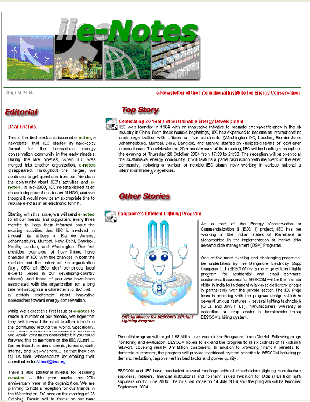
This is the first electronic issue of e-notes, a newsletter that IIEC started in hard-copy format for the international energy conservation community in the early nineties. During the late nineties, when IIEC was merged into another organization, e-notes disappeared. Throughout the merger, we continued to get questions from our friends in the community about IIEC's activities and e-notes. In mid-2003, IIEC re-established itself as an independent not-for-profit NGO, and we thought it would now be an appropriate time to resume e-notes in an electronic format. Starting with this issue, we will send e-notes to all our friends and supporters every three months to keep them informed about the exciting activities that IIEC is involved in through its offices in Rio de Janeiro, Johannesburg, Mumbai, New Delhi, Bangkok, Manila, London, and Washington. The first provides examples of how things have changed in IIEC with the changes in both the markets and the nature of the organization (e.g., 95% of IIECs staff comprises local experts based in our developing-country offices). And those of you who have been associated with the organization for a long time will recognize a characteristic IIEC trait -- a certain excitement about innovative approaches toward energy conservation.
While we expect this first issue of e-notes to reach a number of our friends, we hope that they will forward the email to other friends in the community around the world. Specifically, we would very much appreciate it if you could forward this to members of the IIEC Alumni … former Board members, clients, funders, staff, interns, and well-wishers… so that they can tell us their whereabouts by emailing their coordinates to This email address is being protected from spambots. You need JavaScript enabled to view it..
There is also additional impetus for resuming e-notes -- this year marks the 20th anniversary year of the organization. We are planning to hold a reception for our friends in the Washington, DC area on the evening of 28 October. Details will to follow on our new website at www.iiec.org. Meanwhile, if you are planning to be in the DC area, RSVP to This email address is being protected from spambots. You need JavaScript enabled to view it. and let us know.
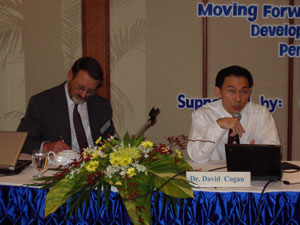
More than forty participants representing twelve economies, mostly ASEAN member countries, attended a regional workshop, "Moving Forward the ASEAN Standards and Labeling Program: Development of the ASEAN Harmonized Energy Performance Test Procedure for Ballast", jointly organized by Collaborative Labeling and Appliance Standards Program (CLASP) and the ASEAN Energy Efficiency and Conservation Sub-Sector Network (EE&C-SSN). The regional workshop was held at Pattaya, Thailand on May 27-28, 2004 and was co-sponsored by Australia Greenhouse Office (AGO), Department of Alternative Energy Development and Efficiency (DEDE), Ministry of Energy, Thailand, Electricity Generating Authority of Thailand (EGAT), and US Department of State, United States Agency for International Development (USAID).
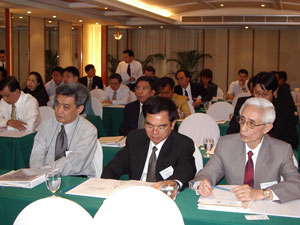 The participants reached agreement on several core elements necessary for development of a harmonized fluorescent lamp ballast energy performance testing procedure for ASEAN member countries such as establishment of a regional working group and corresponding national working committees as a center for current and future efforts related to development of the ASEAN S&L program. The participants also discussed a number of issues related to the energy performance testing procedures for fluorescent lamp ballasts and they agreed that the harmonized standard is vital for the success of the ASEAN S&L program. CLASP is going produce a set of common methods for measuring ballast energy consumption efficiency and performance and disseminate the document to relevant technical experts in each member country for review. The participants reached agreement on several core elements necessary for development of a harmonized fluorescent lamp ballast energy performance testing procedure for ASEAN member countries such as establishment of a regional working group and corresponding national working committees as a center for current and future efforts related to development of the ASEAN S&L program. The participants also discussed a number of issues related to the energy performance testing procedures for fluorescent lamp ballasts and they agreed that the harmonized standard is vital for the success of the ASEAN S&L program. CLASP is going produce a set of common methods for measuring ballast energy consumption efficiency and performance and disseminate the document to relevant technical experts in each member country for review.
For more information, please visit www.clasponline.org
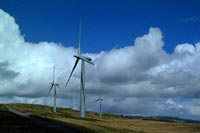
The Philippines will soon have a Green Energy Rating Program (Green E) that will rate and recognize outstanding renewable energy projects implemented in the country based on objective environmental criteria. It will serve as a mechanism to award and provide incentive to project developers and end-users that gave significant and active participation in successful RE projects. Green-E is among the promotional programs that will be developed under the Philippine Capacity Building to Remove Barriers to Renewable Energy Development (CBRED) Project, a project supported by the Global Environment Facility (GEF) through the United Nations Development Program (UNDP) and implemented by the Philippine DOE.
IIEC is tasked to design the whole program and to conduct a pilot test of the design by the end of 2004. The design will include the development of the criteria, rating scheme, operating guidelines, monitoring and evaluation protocols, assistance in the identification and training of the members of the Verification Committee, financial plan as well as strategy to promote the program.
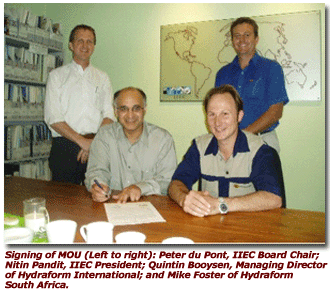
IIEC's Bricks for Houses programme undertaken with a Development Marketplace award from the World Bank's Small and Medium Enterprises (SME) Global Capacity Building Facility (GCBF) aims to introduce non-conventional brick-making technology to transform the housing market in South Africa. This envisioned market transformation will be achieved through capacitation of SMEs in local brick-making technology in order to access mainstream housing practices and activities in South Africa. A crucial component of changing the housing market to absorb more SMEs, as well as non-conventional bricks is the development of business models that will allow SMEs to enter the market and sustain their market presence through non-conventional brick-making.
IIEC identified a project partner in the form of Hydraform Africa Pty Ltd. Hydrafrom Africa is the designer and manufacturer of the Hydraform Compressed Earth Block machines which manufactures an interlocking compressed earth brick. IIEC and Hydraform formalised their relationship by way of a memorandum of understanding signed in May 2004 to 'increase the participation of SMEs and the uptake of non-conventional bricks in the mainstream housing market'. The technology and SME business model will be tested in case study projects of which the Lynedoch village in Cape Town will be the first. The IFC's participation in the development of the village will therefore be extended in the demonstration through the African Project Development Fund's role as the local agent for this World Bank GCBF award to IIEC.

As a part of the Energy Conservation and Commercialization II (ECO II) project, IIEC has been working in the Indian states of Karnataka and Maharashtra in the implementation of market driven Demand-side Management (DSM) Programs.
One of the most exciting and challenging programs to be undertaken by the Bangalore Electricity Supply Company Ltd (BESCOM) is an energy efficient lighting program for the residential and small commercial customers. If successful, BESCOM will be the first state utility in India to implement a large-scale lighting program in partnership with the private sector. The IIEC Project team is assisting with the program design which have several unique features - several lighting technologies (CFLs and 36W FTLs), manufacturers warranty and collection of lamp costs in installments through BESCOM's billing system.
The initial program will target 1.68 Million customers in the Bangalore Urban District and following program monitoring and evaluation, BESCOM hopes to expand the program to all six districts of its distribution network covering nearly 3.9 Million customers. In addition to providing financial benefits to its domestic customers, the program will provide significant system benefits to BESCOM including peak demand reduction, improvement in load factor and power quality.
BESCOM and IIEC have conducted several meetings with all the stakeholders (lighting manufacturers, suppliers, retailers, financial institutions) and formally issued Invitation for Bids (IFB) from lighting suppliers on 12 June 2004. The bids will close on 14 July 2004 and the program will be launched in September 2004.
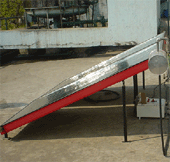 Boilers and hot water generators are major consumers of energy in all sectors. The potential for efficiency improvement and energy conservation is significant, especially in small and medium enterprises (SMEs). The renewable energy industry has long proposed the integration of solar-thermal technology as one important measure for efficiency improvement. However, while solar-thermal hot water systems have made significant inroads in some markets, their use in industrial and commercial settings has been minimal. As a part of IIEC’s Solar-Thermal Market Facilitation Initiative (STMFI), ground-breaking projects in India and Thailand are set up to demonstrate commercial applications of solar-thermal system integration for boiler feed-water pre-heating. The next stage of STMFI is the scale-up of this renewable energy based efficiency measure around the world. Boilers and hot water generators are major consumers of energy in all sectors. The potential for efficiency improvement and energy conservation is significant, especially in small and medium enterprises (SMEs). The renewable energy industry has long proposed the integration of solar-thermal technology as one important measure for efficiency improvement. However, while solar-thermal hot water systems have made significant inroads in some markets, their use in industrial and commercial settings has been minimal. As a part of IIEC’s Solar-Thermal Market Facilitation Initiative (STMFI), ground-breaking projects in India and Thailand are set up to demonstrate commercial applications of solar-thermal system integration for boiler feed-water pre-heating. The next stage of STMFI is the scale-up of this renewable energy based efficiency measure around the world.
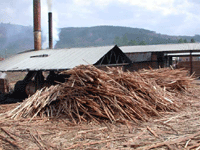 The South African renewable energy white paper was approved by cabinet in November 2003. The essence of the paper is a target of “an additional 10 000GWh of renewable energy contribution to final energy consumption annually by 2013 to be produced mainly from biomass, wind, solar and small-scale hydro. The initial delay in the approval of this target was caused by the absence of an estimate of the macro-economic impacts of pursuit of the target, primarily through direct fiscal subsidy of the technologies in question. This financial and economic analysis study was aimed at assisting the South African Department of Minerals and Energy (DME) with the selection of the optimal mix of technologies for fulfilling the renewable energy additional annual target contribution of 10 000 GWh., using a least-cost basis for South African society. In order to select the least-cost RE technology mix, supply curves have been drawn up for each of landfill gas; pulp, paper and sugar industries; solar water heating, small hydro and wind. IIEC provided technical input on the wind technology component in determination of the total national resource and derivation of a financial cost curve for this technology across various resource categories. The South African renewable energy white paper was approved by cabinet in November 2003. The essence of the paper is a target of “an additional 10 000GWh of renewable energy contribution to final energy consumption annually by 2013 to be produced mainly from biomass, wind, solar and small-scale hydro. The initial delay in the approval of this target was caused by the absence of an estimate of the macro-economic impacts of pursuit of the target, primarily through direct fiscal subsidy of the technologies in question. This financial and economic analysis study was aimed at assisting the South African Department of Minerals and Energy (DME) with the selection of the optimal mix of technologies for fulfilling the renewable energy additional annual target contribution of 10 000 GWh., using a least-cost basis for South African society. In order to select the least-cost RE technology mix, supply curves have been drawn up for each of landfill gas; pulp, paper and sugar industries; solar water heating, small hydro and wind. IIEC provided technical input on the wind technology component in determination of the total national resource and derivation of a financial cost curve for this technology across various resource categories.
The same input data as that used for drawing up the supply curves was also used for macroeconomic impact analysis, undertaken by Conningarth Economists. This analysis, which uses a partial general equilibrium econometric model that incorporates the South African Social Accounting Matrix (SAM), assesses the impact that the introduction of RE technologies will have on parameters such as employment creation, low income household incomes, and Gross Domestic Product.
The net impact on GDP of investing in RE technologies rather than in a coal-fired power station in achieving the ten-year target has now been modelled to be as high as 1 000 million Rand (Rand 6.3=US$1) per year (2003). This impact includes both the initial construction phase as well as ongoing operations. This impact is to be achieved through support of new generating facilities beyond the financially viable level of approximately 5 400 GWh annually. The study quantified the first order cost-benefit of pursuing the target through direct fiscal subsidisation.
 Using solar energy for domestic water heating purposes is not new to the developing countries. In India, several policy measures, subsidy and incentive programs, and capacity building programs exist for solar systems manufacturers. As of October 2003, there are approximately 2000 units of an average capacity of 200 liters solar water heating systems installed in India. Above number includes systems installed in several hotels and resorts throughout the country. However, this application, though scientifically proven and well engineered, has not yet found any substantial applications in the industrial sector. Using solar energy for domestic water heating purposes is not new to the developing countries. In India, several policy measures, subsidy and incentive programs, and capacity building programs exist for solar systems manufacturers. As of October 2003, there are approximately 2000 units of an average capacity of 200 liters solar water heating systems installed in India. Above number includes systems installed in several hotels and resorts throughout the country. However, this application, though scientifically proven and well engineered, has not yet found any substantial applications in the industrial sector.
Research efforts have recognized the potential for using solar thermal water systems in the boiler feed water applications, at least in the low-pressure boilers. This potential still remains un-tapped in India and most of the developing countries. The International Institute for Energy Conservation (IIEC) recognized the need to evaluate and demonstrate this concept in practice. As institutional partners, BASF Limited showed keen interest in developing the feasibility of this application.
"BASF as a part of its “Responsible Care” goals recognized the opportunity to integrate solar water heating system in boiler feed water applications. Solar preheating proposed at BASF merges well with other energy recovery options such as condensate recovery and flash steam recovery. This is a big decision for any operating industry. IIEC played a key role in the technology comparison and building our confidence in the system, by providing an independent assessment of this process. I am sure that other process industries such as textiles, food processing and chemicals will benefit from such technologies.", Mr. K. V. Soali of BASF commented.
Initial work in this process looked at:
-
Technology assessment and comparison of multiple options (thermosyphon, forced flow systems and evacuated tubular collectors)
-
Cost-economics of preheating approximately 80,000 liters per day water from an average ambient of 21.4 deg C to 65 deg C.
-
Financial packaging considering impacts of MODVAT on reduced fuel oil consumption.
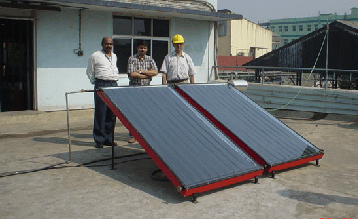
Demonstration at BASF Factory
"We at IIEC believe in on-the ground technology demonstration that builds the confidence of users, suppliers, and financing institutions. By assisting in the development and demonstration of new concepts in real life commercial settings, IIEC achieves its non-profit, missionary objectives to scale up sustainable technologies at the industrial scale. IIEC, through its continual efforts in the Solar-Thermal Program, will generate awareness for such boiler systems throughout the cross-section of the industries, especially in the small and medium enterprises.", Dr. Nitin Pandit, President of IIEC said.
Finalized details of solar-thermal system, which is under active consideration by BASF:
- A two-phase approach is planned, first one to preheat 20,000 liters per day and the second to preheat 37,000 liters per day of boiler feedwater
-
Estimated fuel saving after commissioning both the phases is 400 Kgs per day or 110,000 Kgs per annum
-
Estimated annual reduction in CO2 emissions is 340 Tons and that of SOx is 8.78 Tons
-
Estimated simple pay back is 4.32 years and that considering the tax savings is 2.66 years
"New applications development in the energy efficiency and renewable energy field is always a challenge for manufacturers. In most of the cases, the real challenge is to generate awareness and build confidence among the users and financiers. BASF, a pioneer in process industry took up the challenge to be the “first-mover” in this application and implementation is under active consideration. IIEC’s role as an independent agency certifying the designs and savings helped bridge the gap in actual drawing-board design to a real-world pilot.", Mr. Dilip Limaye, Director, Synergic India Private Limited commented.
For further details, contact Mahesh Patankar of IIEC at This email address is being protected from spambots. You need JavaScript enabled to view it.
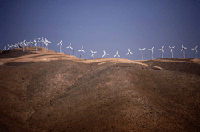
In preparation for the International Conference on Renewable Energy in Bonn, June 1-4, 2004, the Heinrich Böll Foundation and the International Institute for Energy Conservation jointly launched a study to examine best practices in developing countries for the successful transition to a renewable energy future. The results are scheduled to be released in early spring 2004. This study will lay out a new way of thinking about renewable energy and its role in development.
The expert workshop that will bring together authors of the study, additional project partners from Brazil, India, Kenya, South Africa and Thailand, and experts from international organizations, donor countries, business and civil society organizations will be organized on Tuesday, January 27, 2004, 8:45am – 3:00pm at the Resources for the Future, 7th Floor; 1616 P Street, NW; Washington DC. This workshop aims at introducing the findings and first analyses of the study to discuss lessons and comparisons. It will look at the shape of the national programs, their effectiveness, and applicability to other countries, and at obstacles for governments, international organizations, business partners and civil society organizations. The expected outcome will be a framework for comparison of lessons and experiences for governments and stakeholders in the case study countries, further peer countries, international organizations as well as donor governments. The results of this workshop will be incorporated in the final study, which is to be published in April 2004.
Click here to download Conference Issue Paper
For more information, visit the conference site at www.renewables2004.de
3rd International Conference on Energy Efficiency in Domestic Appliances and Lighting
The European Commission and SOFTECH in collaboration with the United Nations, the International Energy Agency and the Collaborative Labeling and Appliance Standards Program (CLASP), will organize the 3rd International Conference on Energy Efficiency in Domestic Appliances and Lighting (EEDAL’03) to be held in 1-3 October, in Turin (Italy).
EEDAL’03 will provide a unique forum to discuss and debate the latest developments in energy and environmental impact of residential appliances and lighting, the policies and programmes adopted and planned, as well as the technical and commercial advances in the dissemination and penetration of energy efficient residential appliances and lighting.
The three-day conference will comprise of 36 sessions including plenary sessions where key representatives of governments and international organisations, manufacturing industry and academia will present their views and programmes to advance energy efficiency in residential appliances and lighting. Parallel sessions on specific themes and topics will allow in-depth discussions among participants.
Who should attend the conference:
- Energy and environment policy makers;
- Energy efficiency and renewable energy sources programme managers;
- Residential appliances and installed equipment manufacturers;
- Residential appliances and lighting market analists;
- Lighting Equipment manufacturers;
- Energy efficiency experts and academics;
- Climate Change experts and academics;
- Electricity and gas distribution utilities;
- Electricity and gas regulatory authorities;
Why you should attend:
- The conference offers the best opportunity to gather in a short time the most updates and relevant information about energy consumption trends in the residential sector, the most recent technological developments, and the planned policies and measures.
- The conference offers during the three days excellent networking opportunities in the numerous social events and debate sessions organized to stimulate exchanges of ideas.
Topics Related to Specific Technologies:
- Residential Appliance/White goods
- Residential HVAC
- Consumer Electronics, Office Equipment & Low Power Modes
- Residential Lighting
- Motor Technologies
- Home Automation and Domestics
- On-site (residential) Power Generation
Topics Related to Policies and Programmes:
- Climate Change
- Policy Delivery
- Standards and Labels
- Measurement Methods and International Harmonization
- Public and Technology Procurement
- Market Transformation Programmes
- End-use Metering Campaigns
- Demand Response, DSM and Energy Services
- Dynamic of Consumption
- Focus on Developing Countries
- Strategies for Increasing Efficiency
Notes:
For more detailed information or view the list of the conference topics, you can visit the conference website: http://energyefficiency.jrc.cec.eu.int/events/eedal2003.htm
In preparation for the International Conference on Renewable Energies in Bonn, June 2004, the Heinrich Böll Foundation and the International Institute for Energy Conservation jointly launched a study to examine best practices in developing countries for the successful transition to a renewable energy future. The results are scheduled to be released in early spring 2004. This study will lay out a new way of thinking about renewable energy an
Background:
Many of the policies, programs and institutional development initiatives that have sought to promote the use of Renewable Energy (RE) systems have largely focused on RE systems alone rather than attempting to integrate RE into the existing energy frameworks. This “fossil today, renewable tomorrow” premise has resulted in many successful projects, but fewer successful, self-sustaining markets for RE in developed as well as developing countries. There is also evidence that conventional approaches to government or multilateral supported, large-scale shifts to singular technologies or energy sources, such as hydro and ethanol in Brazil, are vulnerable to conditions beyond their control. In other cases, some other integrated approaches, such as Germany’s solar access laws, have had measured success, but only for limited periods. There is clearly a need to look not only at diversified energy policies and solutions, but also to ensure that those solutions work with existing energy systems to ensure a sustainable transition to greater renewable energy use.
The Study:
The International Institute for Energy Conservation, with the generous support of the Heinrich Böll Foundation, is initiating a study of international “Best Practices” (and worst practices) in the areas of policy, programs and institutional development as part of the North-South dialogue. The goal is to create a framework for a debate about the necessary and sufficient conditions for increasing the market share of renewable and efficiency (R&E) technologies.
The premise of this effort is that the RE community should look not only at the end goal of RE “output” but also at the creation of the proper enabling environment for the integration of RE systems into the existing systems. The goal of this approach is a more gradual, organic, market-driven transition to a more sustainable energy system that meets the needs of local communities, economic forces and government objectives.
The study will evaluate the best practices in the areas of policies, programs, institutional development in both developing and developed economies in order to ascertain whether there are lessons to be learned from both successes and failures. The study will attempt to look at a sample of best practices in a variety of countries, such as Brazil, India, the Philippines, South Africa and Thailand. It will evaluate individual policies, programs and institutions as well as instances where they were best integrated for a successful transition to greater RE use. It will also focus on several thematic tracks: policy frameworks, technical integration (e.g., hybrid systems), institutional development (including finance), and program designs. Finally there will be review of those nations where the integration of multiple approaches has resulted in the most sustainable market penetration of RE systems.
More information:
Nitin Pandit, Executive Director, International Institute for Energy Conservation: This email address is being protected from spambots. You need JavaScript enabled to view it.
Marc Berthold, Program Director, Heinrich Böll Foundation North America: This email address is being protected from spambots. You need JavaScript enabled to view it.
d its role in development.
The International Institute for Energy Conservation (IIEC) have recently been awarded $1.9 million funding for the Energy Conservation and Commercialization II (ECO-II) project from the Government of India and the U.S. Agency for International Development (USAID).
The objective of ECO-II is to provide the Government of India, the Bureau of Energy Efficiency (BEE) with necessary technical assistance and training support to implement portions (DSM and Building Codes) of its Action Plan, through USAID’s ECO project. The implementation of this program will be guided by the core values of USAID – customer focus, teamwork, results oriented, empowerment and accountability. The requirement is for hands-on technical assistance and training support in DSM and Building Codes. In addition, the program is expected to compliment other ongoing activities supported by various donor agencies, primarily, USAID, GTZ and ADB. This program falls under USAID’ s strategic objective of Improved Access to Clean Energy and Water.
For more information contact: This email address is being protected from spambots. You need JavaScript enabled to view it.
Newsletter
Don't miss any updates of our new projects and activities.
| |